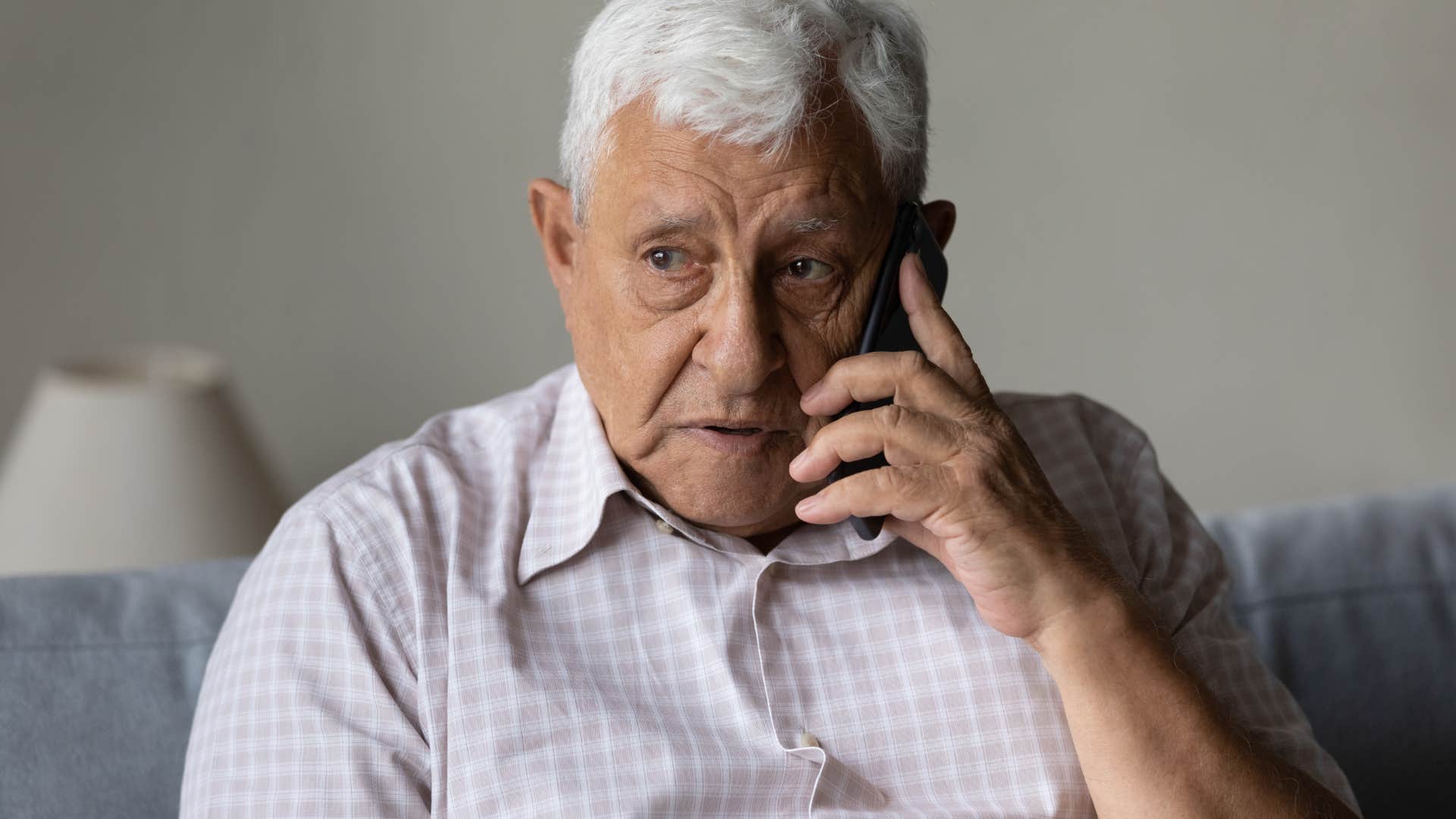Adult Children Who Emotionally Withdraw From Their Parents Usually Have These 11 Reasons
Mutual respect is the foundation for any kind of healthy relationship.
 ViDI Studio | Shutterstock
ViDI Studio | Shutterstock Our childhood experiences hold a lot of power in influencing our adult lives, even when we've made the intentional decision to create space or disconnect from family members, according to a study from BMC Public Health. Whether it's a narcissistic parent, financial instability, or other childhood traumas, we tend to carry those experiences with us into adulthood, motivated by coping mechanisms and misguided truths we learned and absorbed as kids.
Many of the reasons adult children who emotionally withdraw from their parents usually have may not be obvious at first, as they're still grappling with unresolved trauma their parents refuse to discuss, coping mechanisms sabotaging their well-being that they've struggled to unlearn, or unproductive conversations today they can't seem to overcome. For some, the solution is estrangement, but for others, it's easier to simply emotionally detach and withdraw, protecting their peace and investing energy into more beneficial connections elsewhere.
Here are 11 reasons adult children who emotionally withdraw from their parents usually have
1. Their struggles aren't being taken seriously
 fizkes | Shutterstock
fizkes | Shutterstock
It's natural for adult children to develop a feeling of belonging and understanding with their parents, according to a study from the Journal of Marriage and Family. Their parents and families are the first glimpse at the community they have growing up, even if they were a part of a dysfunctional dynamic.
While this specific study discusses the adverse physical and emotional effects of growing up with parents that sabotage that kind of basic understanding and respect, the truth is that feeling unheard and unvalued at home follows you into adulthood.
Oftentimes, this experience manifests in different ways for adult children — from being dismissed trying to speak about childhood trauma, to being met with unsolicited advice to struggles, and even being invalidated for speaking about mental health.
These are some of the most common and invalidating ways parents sabotage their relationships with children into adulthood, and one of the reasons adult children who emotionally withdraw from their parents usually have.
2. Their parents have poor communication skills
 PeopleImages.com - Yuri A | Shutterstock
PeopleImages.com - Yuri A | Shutterstock
One of the reasons adult children tend to emotionally withdraw from their parents is the experience of feeling unheard. Their parents may have communication styles that actively sabotage their kids' well-being — guilt-tripping them for not spending time together, dismissing their concerns, or even actively disrespecting them with passive and casual language.
Of course, according to a 2022 study on childhood trauma, many adult children who have unresolved resentment from their childhoods tend to adopt poor communication skills from their parents as well. So, it's not just their parents that may struggle to bond or communicate effectively with their kids, it's a two-way street fundamentally affected by resentment, frustration, and disconnection.
3. There's a pattern of disrespect
 fizkes | Shutterstock
fizkes | Shutterstock
Especially considering there's a natural disconnect — both physically and fundamentally, often as a result of generational differences — between parents and their kids into adulthood, it's not surprising that many times people unintentionally cross the other's boundaries or say something disrespectful.
However, many of the reasons why adult children emotionally withdraw from their parents revolve around a pattern of behavior. Even after they've reminded their parents about their boundaries and put effort into maintaining them — from privacy, to unannounced visits, and communication styles — they still feel consistently disrespected.
Like clinical psychologist Samantha Stein argues, mutual respect is necessary for any kind of relationship. If someone is disrespecting you, prioritizing their own needs consistently over yours, and sabotaging your boundaries, they clearly don't value you in the same way that you deserve.
4. They can't talk about differing opinions
 fizkes | Shutterstock
fizkes | Shutterstock
In today's world, where political discussions and values have become intertwined and inherently personal, it's incredibly taxing to maintain a relationship with someone who has differing values, especially if you're unable to have empathetic and understanding conversations with the other side.
For parents and adult children, who often have generationally different beliefs and value systems, this lack of empathy, respect, and healthy communication can cause either side to emotionally withdraw.
For younger generations of adult children, like Gen Zers, who are largely crafting their lives around political activism and their values, it's not surprising that this is one of the fundamental reasons why they choose to emotionally withdraw from their parents and families when they can't have conversations about them without leaving feeling unvalued and disrespected.
5. Their parents guilt-trip them
 Twinsterphoto | Shutterstock
Twinsterphoto | Shutterstock
According to a study from Smith College, parents who refuse to take accountability and instead blame-shift and guilt-trip their kids into shouldering their responsibilities and mistakes tend to sabotage their kids' well-being.
These behaviors not only spark low self-esteem, anxiety, and unworthiness in their kids from an early age, they make it hard for adult children to feel comfortable expressing vulnerability later in life around their families. In adulthood, they may grow resentment and cope by creating physical or emotional space from their parents, affected by the invalidating and dismissive feelings their parents' guilt-tripping behaviors spark.
6. They feel embarrassed and ashamed at home
 ViDI Studio | Shutterstock
ViDI Studio | Shutterstock
There are a number of reasons why an adult child may feel embarrassed or ashamed at home with their parents, often sparked by conversations around differing values and identity. Feeling accepted is part of our human nature — we want to feel valued by the people we appreciate and love in our lives, but when we don't, it's our emotional well-being and self-esteem that suffers.
Adult children who emotionally withdraw from their parents usually have these reasons — they'd prefer to invest energy into relationships with people that respect them for who they are, rather than continue to suffer the emotional and physical consequences of a toxic family dynamic.
7. Everything feels like a competition
 Amnaj Khetsamtip | Shutterstock
Amnaj Khetsamtip | Shutterstock
Oftentimes, adult children bear the burdens of their parents' insecurity — a kind of deep-rooted trauma that often manifests itself through envy, jealousy, and emotional manipulative behaviors. They view their children as competition, whether they're aware of it or not, trying to make themselves feel "needed" amid disconnect and loneliness.
Of course, this isn't benefiting anyone. Adult children who feel ashamed to be themselves and talk about their achievements at home will inherently pull away, and parents who only feel secure around their kids are bound to feel resentful at some point or another.
8. Their parents feel entitled to their energy
 fizkes | Shutterstock
fizkes | Shutterstock
Many parents struggle to truly learn and accept their kids' independence and autonomy in adulthood, having spent that last decade completely responsible for solving their problems, meeting their needs, and protecting them.
They feel a sense of entitlement around their kids, even if they're not fully aware of it, that often dismisses and invalidates the independence adult children appreciate later in life. They feel entitled to their kids' space, time, energy, and well-being, often using overbearing behaviors and language to guilt them into spending more time together.
9. Their parents are insecure
 fizkes | Shutterstock
fizkes | Shutterstock
According to a study from the Scandinavian Journal of Public Health, many older generations struggle with a deep-rooted sense of insecurity that fuels their loneliness, social isolation, and irritability as they age. While these can be incredibly individualistic and internal dilemmas, a parent's insecurity can also manifest in behaviors that sabotage the well-being of their relationships with family members as well.
We all struggle with our own eccentric insecurities and personal struggles, but if you're taking the time to address them and work through the behaviors that may manifest as a result, they don't usually sabotage relationship fitness. However, if an adult child is being consistently affected by their parents' insecurities, they may feel the need to emotionally disconnect.
10. They feel worse after opening up around them
 fizkes | Shutterstock
fizkes | Shutterstock
The healthiest, most supportive relationships in our lives empower us to be more vulnerable and give us a sense of security to navigate our lives after getting honest about our struggles. However, adult children who emotionally withdraw from their parents usually find themselves in a much different dynamic — feeling ashamed for their struggles, less confident in themselves, and more anxious after getting vulnerable at home.
For some, it's a side effect of mental health stigmas that still greatly affect older generations of parents. They view vulnerability and mental illness as "a weakness" and condemn any kind of emotional expression in their kids.
11. They feel unheard
 winnievinzence | Shutterstock
winnievinzence | Shutterstock
At the end of the day, one of the most common reasons adult children emotionally withdraw from their parents is because they feel unheard. It's a fundamental aspect of our relationships, according to a PLOS One study — to feel heard and valued — yet so many people overlook the communicative habits and behaviors that prioritize it on a daily basis.
When parents overlook their children's needs, disrespect their boundaries, or even guilt-trip them into spending more time at home, they're dismissing the things their kids really want — unconditional love, support, and mutual respect.
Zayda Slabbekoorn is a staff writer with a bachelor's degree in social relations & policy and gender studies who focuses on psychology, relationships, self-help, and human interest stories.

